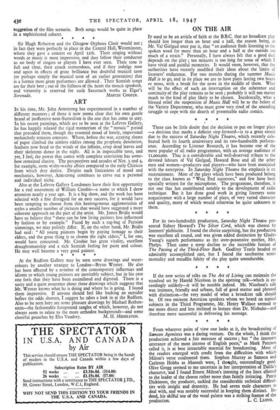ON THE AIR
IT used to be an article of faith at the B.B.C. that no broadcast play should last longer than an hour and a half, the reason being, as Mr. Val Gielgud once put it, that " an audience finds listening to the spoken word for more than an hour and a half at the outside too much of a strain." Personally, I have always felt that a good deal dependi on the play • ten minutes is too long for some of which I have vivid and painful memories. It would seem, however, that the authorities have recently modified their ideas about the limits of listeners' endurance. For two months during the summer Music Hall is to go, and in its place we are to have plays lasting two hours or more, with a break for the news in the middle of them. What will be the effect of such an interruption on the coherence and continuity of the play remains to be seen • probably it will not matter much to the kind of play likely to be chosen. Incidentally, what a blessed relief the suspension of Music Hall will be to the helots of the Variety Department, who must grow very tired of the unending struggle to cope with the dearth of presentable radio comics.
* * * * There can be little doubt that the decision to put on longer plays —a decision that marks a definite step forward—is to a great extent due to the success of Saturday Night Theatre, which recently cele- brated both its fourth anniversary and its two-hundredth perform- ance. According to Listener Research, it has become one of the most popular of all radio programmes, with an average audience of er,000,000. That is a considerable and well-deserved tribute to the devoted labours of Val Gielgud, Howard Rose and all the other men and women—producers and players—who have been associated with the enterprise. In Saturday Night Theatre the emphasis is on entertainment. Most of the plays which have been produced belong to the class known as " West End successes," and few have been specially written for the microphone. The programme, therefore, is not one that has contributed notably to the development of radio technique. But it has done good work in giving listeners some acquaintance with a large number of plays, of very varied character and quality, many of which would otherwise be quite unknown to them.
For its two-hundredth production, Saturday Night Theatre pre- sented Sidney Howard's The Silver Cord, which was chosen by listeners' plebiscite. I found the choice surprising, but the production was excellent all round, and was given added distinction by Gladys Young's superb performance as the over-possessive mother, Mrs. Phelps. Then came a steep decline to the incredible fustian of The Passing of the Third-Floor Back. Godfrey Tearle headed an admirably accomplished cast, but I found the saccharine senti- mentality and maudlin falsity of the play quite unendurable.
If the new series of talks on The Art of Living can maintain the standard set by Harold Nicolson in the opening talk—which is ex- ceedingly unlikely—it will be notable indeed. Mr. Nicolson's talk was intimate, friendly and urbane, full of good matter and phrased with distinction—the very model of what a broadcast talk should be. Of two eminent American speakers whom we heard on topical subjects in the Third Programme, Mr. Henry Wallace seemed to me more direct and less inclined to lecture than Dr. Niebuhr—and therefore more successful in delivering his message.
From whatever point of view one looks at it, the broadcasting of Samson Agonistes was a daring venture. On the whole, I think the production achieved a fair measure of success ; but " the intensest utterance of the most intense of English poets," as Mark Paulson called it, is at best intractable material for broadcasting. Most of the readers emerged with credit from the difficulties with which Milton's verse confronted them. Stephen Murray as Samson and Carleton Hobbs as Manoah were, I thought, outstandingly good. Olive Gregg seemed to me uncertain in her interpretation of Dalila's character, 'and I found Ernest Milton's intoning of the lines allotted to the leader of the chorus rather more than faintly irritating. Patric Dickinson, the producer, tackled the considerable technical difficul- ties with insight and dexterity. He had seven male characters to deal with, and was notably successful in keeping them distinct. In- deed, his skilful use of the vocal palette was a striking feature of the


































 Previous page
Previous page